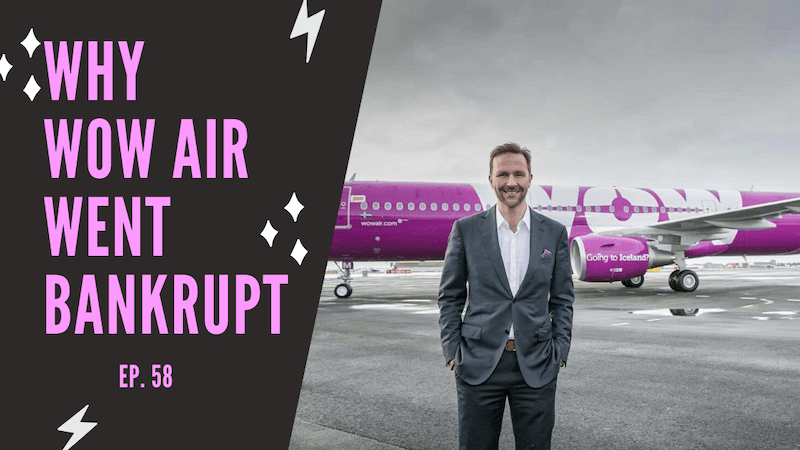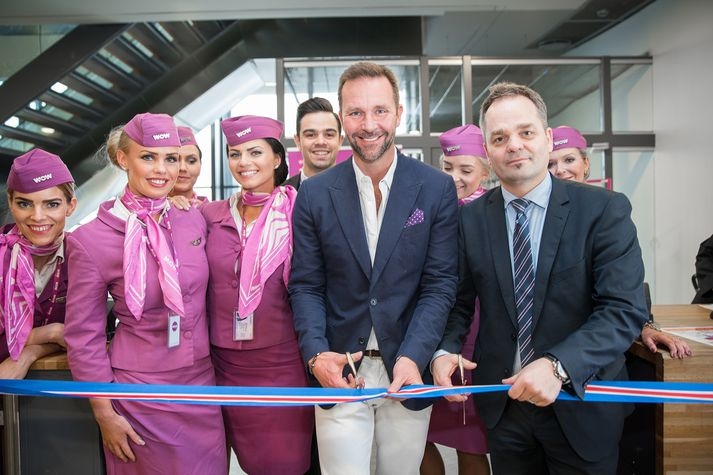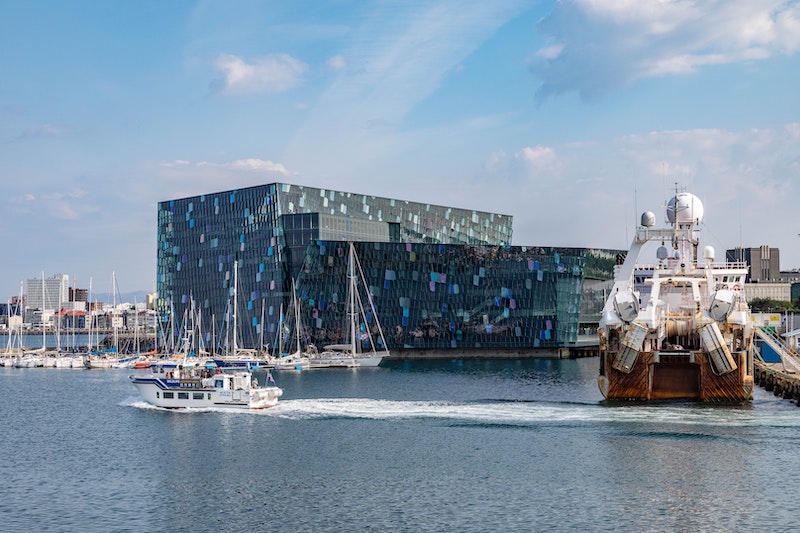

It is a little hard to believe that it is almost the one year anniversary of the bankruptcy of Wow Air. This low cost Icelandic airline went bust on March 28th, 2019. On that date last year, everyone was shocked when the airline suddenly ceased to operate. During this episode, I will go over why and how the airline skyrocketed to success, what it was like during its heyday, what caused WOW Air to fail, how its bankruptcy affected the Icelandic economy, and what’s next.
Skúli Mogensen – The Founder of Wow Air
To me, the most logical place to start this story is with Skúli Mogensen, the founder of WOW Air.
Born to Icelandic parents, Skúli spent much of his youth in Sweden. His dad was studying to become a physician there. He is fluent in Swedish and Icelandic. Skúli moved back to Iceland and attended high school and some college years there. He didn’t finish college because his company Oz Communications, a mobile software company, took off, so he dropped out.
According to an interview in the Financial Post, Mogensen credits his entrepreneurial drive to his education at the University of Iceland. One of his philosophy professors encouraged him to challenge everything. He is quoting as saying in the article,
Challenge the status quo, challenge the dogma and challenge whatever worked yesterday. I think today the speed of things requires you to ultimately — maybe not always challenge, but at least ask questions about whether what you are doing today will actually work tomorrow.
Skúli´s Philosophy Professor
Skúli Dropped Out of College to be an Entreprenuer
Skúli was able to grow OZ to over 200 employees. The company sold more than 100 million copies of its messaging software to major mobile operators. Nokia ended up buying OZ communications in 2008 for an undisclosed amount. Along with starting OZ, Skúli also co-founded Íslandssimi, which is now Vodafone Iceland. Additionally, he co-founded CAOZ, a 3-D animation studio that works on production for films, commercials and games. His serial entrepreneurship made him a billionaire. After selling OZ communications, Skúli went into early retirement at the age of 40. However, he quickly grew tired of it after a couple of years.
According to a Forbes article about Skúl in 2018, he said “I was a failure at retirement. I wanted to use technology to disrupt the market and the airline industry is a good sector for that.”
WOW Air was Born in 2011

Skúli was ready to go full force into starting an airline with his own money. His family, friends and investors urged him not to do it back in 2011. One thing to remember about this time is that Eyjafjallajökull volcano had erupted in 2010.
Even though the ash from the eruption had disrupted air travel for people around the world, the media focus on Iceland had exposed to the world that the country was home to some of the most spectacular nature. Icelandic tourism was starting to increase around that time. However, Skúli’s idea of starting a low budget airline helped skyrocket Icelandic tourism into being one of the main industry to revive Iceland after the economic crash.
Cheap Airfare Helped to Fuel Tourism to Iceland
The trans-Atlantic low cost airline started off with fares starting from $99 for basic seats and service. You could fly from some cities in the U.S. to Iceland and the rest of Europe. Those fares, along with the value of Icelandic krona being so low, made traveling to and in the country affordable for many people who wouldn’t otherwise have come here.
Within its first year, the airline transported 110,000 passengers. That number quadrupled just five years later. It’s incredible that in 2017 it had been reported that 2.8 million passengers had flown with WOW Air. I moved to Iceland in the summer of 2016. I remember thinking that it must be so cool to work for that airline. They had such great advertisements, happy looking staff and it seemed like their growth would not stop anytime soon.
Skúli & WOW Air Were Flying High

In 2017, they had surpassed Icelandair, their main rival, for the number of outbound Icelandic passengers and had 38% market share. Skúli was hiring talented people from around the globe because there just weren’t enough people in Iceland to fill the roles. I think the diversity in the company and the fact that people worked in teams, helped to WOW Air to set themselves apart.
By 2018, the airline had purchased 20 planes, had over 1,000 employees, and was flying to over 35 cities internationally. Incredibly the airline had been growing at a rate of 75-80 percent every year since its inception. At least that was the number reported in a Forbes article in 2018.
Trouble in Paradise
From an outsider’s view, the fast growth seemed amazing but on the inside crucial mistakes were being made that would eventually lead to the company’s demise. The biggest red flag is when WOW Air reported a loss of ISK 4.8 billion ($39.3 million, at the time) between July 2017 and July 2018. It was also reported in 2018 in media outlets that WOW Air owed ISAVIA, the state owned company that runs the airport, ISK 2 billion in landing fees. So, the company essentially owed the tax payers of Iceland this money.
On top of that, the rising cost of fuel worked against them. At the end of August 2018, jet fuel had risen to $92 a barrel. That was a 25% increase when compared to the year before. To make matters even more complicated, competition among airlines that have transatlantic routes is fierce. The odds kept getting stacked against WOW Air. Skúli wanted to keep his company alive but he couldn’t do it on his own anymore.
Skúli Turns to Icelandair for Help

In the fall of 2018, the company explored all of its options for staying afloat. Even though bondholders of Wow Air pumped ISK 8.2 billion ($66.9 million at the time) in the airline, it still wasn’t enough. Reality started to hit hard when the airline had to stop operating routes, such as San Francisco, Cincinnati, Cleveland, Pittsburgh, St. Louis, Edinburgh, Stockholm and Tel Aviv.
That might have seemed bad but the worst was yet to come. The one thing Skúli was dreading was having to go to Icelandair for a bailout. Unfortunately, I am not privy to what it was like to work for WOW Air but it was well known that they saw Icelandair as their biggest competitor. It must have been quite humbling for Skúli to have to swallow his pride and try to convince Icelandair to save his company.
The Talks with Icelandair Go South
During the talks in November, the mutual benefits were laid out on the table. If Icelandair merged with WOW Air, it would solve the company’s debt problems. In exchange, Wow Air would be able to help the national airline be more competitive on the international market. The deal would be that they would continue to operate under their existing brands. This merger would mean that Icelandair would control 3.8% of the Atlantic aviation market.
The shareholders of Icelandair were hesitant about approving this deal and, unfortunately, it fell through. For Skúli, it was a lost battle but he still planned to win the war. Before I go any further, I have to point out that during this time, Wow Air went ahead with operating low cost flights to India, even though it was clearly struggling to stay alive. I don’t know if this was purely an act of desperation by the company or a ploy to show people that they were ok.
IndiGo Partners Shows Interest in Investing
Skúli was in talks with Indigo Partners about a potential investment. Indigo Partners is a private equity firm that has controlling interest in Frontier Airlines (based in the U.S.), JetSmart (based in Chile) and holds stakes in Volaris, a Mexican budget airline, and Wizz Air, a low cost airline in Europe. Obviously, this was potentially a good fit for WOW Air. Not long after the Icelandair deal fell through, it was announced that Skúli and Indigo Partners had made a temporary investment agreement. However, this deal meant that WOW would have to change quite a bit to become the low cost airline that Indigo Partners would agree to invest in.
The main thing for Skúli was that he remained the majority shareholder in the company. Some of the demands of Indigo Partners included streamlining operations. According to an article by Iceland Review,
There were layoffs: 15 WOW employees at the airport, 237 employees of an airport support services company, and then, just weeks before Christmas, 111 additional WOW employees were let go. WOW reduced its fleet from 20 to 11 short- to medium-range aircraft. It sold its flight times at Gatwick, making Stansted its only destination in the UK, and lastly, extracted itself – at substantial cost – from a contract with an Irish aircraft rental company.
Iceland review
IndiGo Partners Changes Up the Terms with WOW Air
All of those changes were made so that Indigo Partners would go ahead with buying 49% of the company. But then Indigo Partners threw a monkey wrench into the deal by changing the terms. Two major changes were made.
The first is that shareholders would have to wait longer to be compensated for their investments and their returns would be linked to the financial success of the airline. The second is that Skúli’s stake in the company would also be linked to the airline’s success. So, if the airline did well then Skúli could end up owning the whole thing again. But if there was more trouble in paradise, he could lose it all.
All of this was unsettling for him and, not surprisingly, he was hesitant about taking the deal. To sweeten the deal, Indigo Partners said they would invest almost double their initial offer – a whooping ISK 10.9 billion ($89.2 million). The expectation was that Skúli would gobble that up but he didn’t and Indigo Partners walked away from the deal on March 21st.
WOW Air Goes Bust
Unexpectedly, Icelandair jumped back in the picture but those talks didn’t amount to anything. In a last ditch effort to keep the company going, Skúli convinced his creditors to convert the debt into shares in WOW Air. One of the main reasons they were willing to do this was out of fear. Everyone assumed that the collapse of WOW Air could mean a big retraction in the tourism industry. It could lead to a recession.
Even with creditors agreeing to change 49% of the company’s debt into shares, someone needed to buy the other 51%. Like a lion stalking its prey, in jumped Indigo Partners again. Once again, the negotiations were not successful. At 8:00 AM on March 28th, WOW Air ceased its operations
The Icelandic Economy Braced for the Worst

The impact of this decision rippled out from within the company. Not only were about 1,100 people going to lose their jobs, but WOW Air passengers were stranded in different cities. It was absolutely awful that so many people were left scrambling to find flights home or had purchased flights that they couldn’t use. Luckily, Icelandair was able to step in and help a lot of people. In addition to passengers being left stranded, Iceland was bracing for the worst.
Personally, I was in the middle of changing jobs at this time last year. I remember hearing about how worried travel companies were about what this meant for their business. There was also a looming labor strike. Some companies had already started to plan layoffs. There was a prediction that the travel industry would struggle over the next nine months and that the GDP of Iceland would contract.
It is true that tourism in Iceland has seen a decline in the last couple of years but the GDP was not badly affected. It grew .2% in the first nine months when compared to the previous year. This is not to say that Wow Air going under has had no effect.
The Tourism Industry was Hit Hard

Three to four hundred WOW Air staff were still unemployed six months after the airline went under. The tourism industry has become even more competitive because everyone is fighting to get the attention of a smaller group of tourists.
The shift of who is coming to Iceland has forced companies to figure out how to adapt new ways of marketing. There has been a big decline in visitors from the United States but it seemed that visitors from the U.K. and China were on the rise.
Tourists from China, in particular, were predicted to be the fastest growing group. However, there is so much uncertainty due to the outbreak of the Coronavirus.
Attempts to Resurrect & Replace WOW Air
One of the most shocking announcements to happen about a week after WOW Air went under is that Skúli said that he plans to resurrect the airline. The team had learned their lesson and were looking for someone to invest $40 million to finance the venture. As many of you know, that didn’t happen.
Months later Michelle Ballarin, one of the owners of USAerospace Associates, purchased the assets of WOW Air. They planned to start flights under the brand in the fall. Everyone was skeptical but hopeful.
Will a Low-Cost Airline Come Back to Iceland?

At around the same time, former employees of WOW Air decided to start their own airline. Initially it was nicknamed WAB, which was an acronym for “We Are Back” but it later turned into Play Air. I laughed quite hard when I heard that because it sounds too close to “player”. It begs the question, “Who is being played in all of this?” Both resurrections made promises of operations happening soon, as early as fall 2019 and none delivered. Now that the world is in crisis mode, there is no telling if either airline will ever get off the ground. I guess only time will tell.
Random Fact of the Episode
When WOW Air announced flights from the U.S. to India via Iceland, it became the first low cost airline carrier to serve India from Iceland using its A330-300 wide body aircraft. The nearly 12 hour return flight was the longest in its route network.
About a month after starting this route, the airline had to pull out. This was due to the cost of fuel and they were trying to cut down on operations to meet the demands of Indigo Partners to cut a deal.
Icelandic Word of the Episode
Flugvél – flying machine or airplane
I hope you enjoyed listening to this episode of the All Things Iceland podcast. If you think someone else will find this episode interesting and/useful please share it. My newsletter is dedicated to sharing even more fascinating information about Iceland.
For your convenience and listening pleasure, this podcast is available on many platforms. You can listen on Spotify, Apple Podcasts, Google Podcasts, Stitcher, and pretty much any platform that plays podcasts.
Let’s be social! Here is where you can connect with me:
Þakka þér kærlega fyrir að hlusta (og að lesa) og sjáumst fljótlega
Thank you kindly for listening (and reading) and see you soon!
I am new to your podcast and YouTube channel, and I want to say that I am thoroughly enjoying both! I had a chance to visit Iceland in 2018 (flew Icelandair) and hope to return again in the future. Iceland is such a fascinating country. Your podcast on WOW Airlines was very interesting and well written! I felt like I was listening to a movie! As I listened, I could almost see Leonardo DiCaprio playing the part of Skuli.
I remember the day WOW airlines shut down and feeling so terrible for passengers who were stranded or had lost money on tickets. I had wondered what had led to such a thing happening so abruptly, and your podcast spells it out in a clear and interesting way. Thanks for sharing!
Hi Elizabeth,
Thanks so much for the lovely comment. I’m glad to hear that you are enjoying the podcast and YouTube videos. Oh, it would be amazing to have Leonardo DiCaprio play Skuli. Also, I think Skuli would be very happy with that choice. LOL. Yea, it was such a troubling time. I was also sad for people who were scrambling to figure out how to return home after the collapse.
Bonne continuation pour ton blog que je continue à suivre réguliérement. Janina Isak Gowon